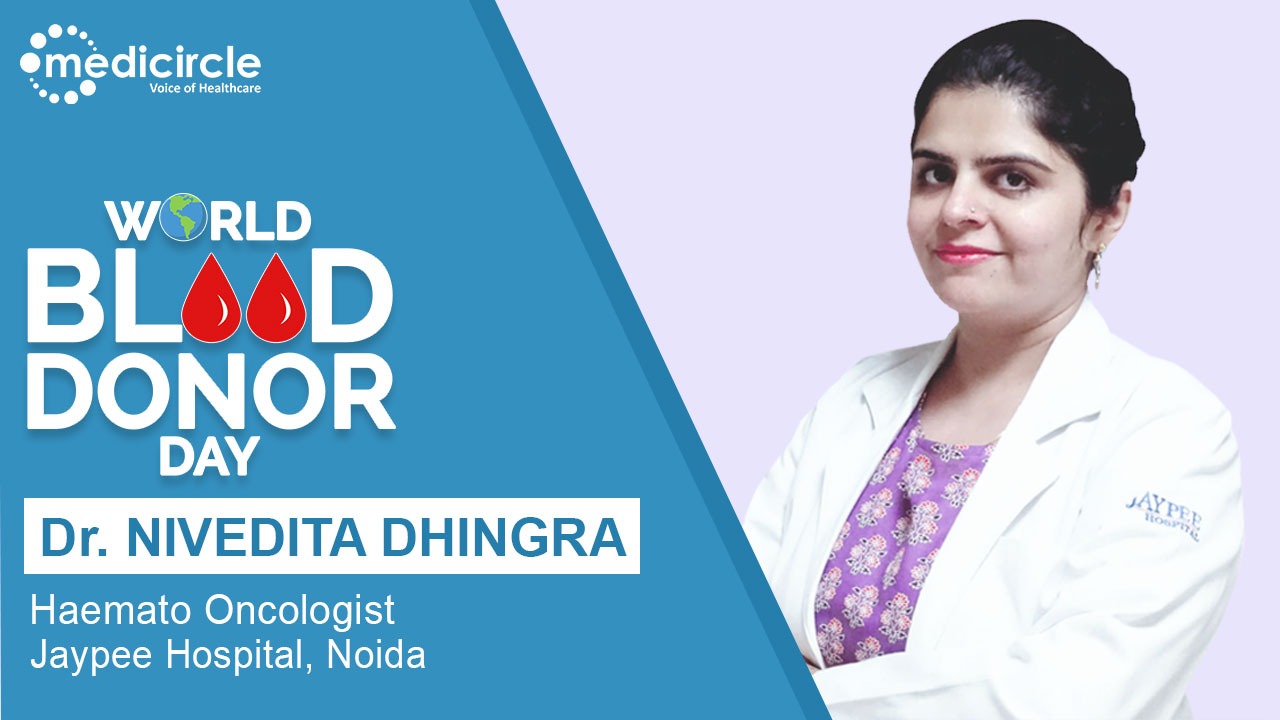India requires 5 crore units of blood every day but only 2.5 crore units get available. There are lots of myths and fears associated with blood donation which need to be removed. Medicircle is conducting an exclusive series on blood donation by speaking to eminent hematologists so that people get aware of the benefits of blood donation and get rid of their misconceptions.
Dr. Nivedita Dhingra is Hemato-Oncologist associated with JP Hospital, Noida. Her areas of interest are acute leukemia, hematopoietic stem cell transplants, hemoglobinopathies, difficult anemias, bleeding disorders, and immunodeficiency disorders. She is a member of the Indian Society of Hematology and Blood Transfusion and the International Society of Pediatric Oncology.
No need to worry about weakness while donating blood
Dr. Nivedita says, “When you go to a blood bank to donate blood, thorough screening is done. According to the criteria, only a fit adult between 18-60 years of age can donate blood. CBC (complete blood count) test is done to check the hemoglobin levels. If a person is anemic, then the blood of such a person is not taken at all. When hemoglobin level is within the required range then only blood donation gets allowed. This eliminates any chances of extreme weakness due to blood donation. There can be a very mild weakness for some time but by and large, people who donate blood remain healthy enough.”
Blood donation intervals
Dr.Nivedita points out, “After 3 months the body reaches its baseline required for next blood donation and a person can donate blood again. Young males can donate blood every 3 months. Due to menstruation issues, women can donate blood every 4 months.”
Dos and Don’ts for blood donation
Dr. Nivedita lists down the following points related to blood donation:
- Blood donation should be done only after thorough history and evaluation for fitness
- If one is pregnant then blood donation should not be allowed
- The right age for donating blood is 18-60 years
- If blood has been donated previously, then the upper age limit for donating blood is 65 years
- If an individual has had blood-borne infections like hepatitis B, hepatitis C, HIV, syphilis, etc. he/she cannot donate blood
- Blood should not be donated in chronic health conditions like cardiac problems
- Hemoglobin levels should be in the desired range
- Menstruating women can donate blood provided their hemoglobin is in the desired range
- Those who regularly donate blood should ensure that there is no deficiency of iron, vitamin B, etc.
- Whether you are planning to donate blood or not, your diet should be healthy, balanced, and rich in all micronutrients
Covid19 and blood donation
Dr. Nivedita mentions, “Since there is such a Covid surge that if there are strict restrictions then there would hardly be enough people to donate blood to meet the blood requirements in our society. As of now, the guidelines are that if the RT-PCR report is negative and a person has recovered from Covid, then he/she can donate blood after 14 days. Also, the latest studies indicate the fact that plasma therapy is hardly effective, and hence as per the currently available data plasma donation is not encouraged."
(Edited by Amrita Priya)

 Dr. Nivedita Dhingra mentions that blood donation is the noblest thing to do to save humanity. She busts myths related to weakness with blood donation and points out that plasma therapy is not effective. She appreciates youngsters as the energetic, intelligent, and socially aware group extending helping hands in COVID times impressively.
Dr. Nivedita Dhingra mentions that blood donation is the noblest thing to do to save humanity. She busts myths related to weakness with blood donation and points out that plasma therapy is not effective. She appreciates youngsters as the energetic, intelligent, and socially aware group extending helping hands in COVID times impressively.




















.jpeg)












